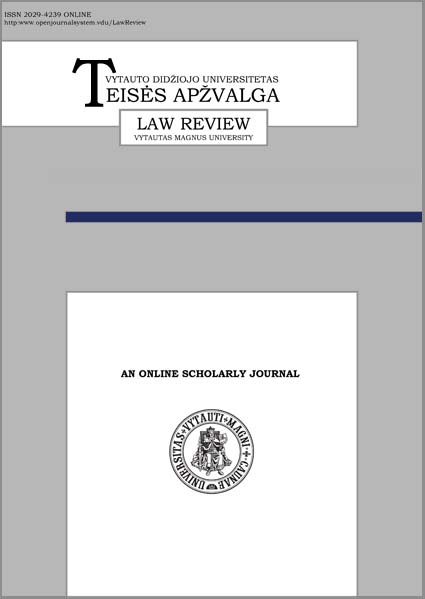Probleminiai sukčiavimo kvalifikavimo ir taikymo aspektai Lietuvos teismų praktikoje
Problematic Aspects of Fraud Qualification and Application in Practice of Lithuanian Courts
Author(s): Olegas ŠibkovasSubject(s): Law, Constitution, Jurisprudence, Criminal Law, Criminology
Published by: Vytauto Didžiojo Universitetas
Keywords: Criminal Law; Criminal responsibility; Fraud; Deceit; Avoidance of property obligation; Offences against financial system;
Summary/Abstract: The article deals with the construction of the fraud rule and the relevant practice of the Supreme Court of Lithuania in criminal cases of fraud. It should be noted that the practice formulated by the Supreme Court of Lithuania in the criminal cases of fraud is an ambiguous one therefore the pre-trial investigation institutions and courts of lower instance face the problems of application and interpretation of the article of the Criminal Code of the Republic of Lithuania providing responsibility for fraud. Great attention in the scientific literature and case law is given to comprehension and interpretation of deceit as a substantial attribute of fraud specifying that deceit is the basic attribute that allows delimiting frauds from other criminal offences and from civil legal relations however ambiguous comprehension of the attribute of deceit per se in the case law presupposes theoretical and practical difficulties on purpose to delimit fraud from offences against financial system and from civil legal relations. Ambiguous and often incorrect treatment and comprehension of the attributes of fraud and elements of deceit predetermine groundlessly lengthy fraud trials, unfair or ill-founded court verdicts in such cases, perverse criminal prosecution of innocent persons or acquittals of guilty persons. The aim of the article is to review and analyse the development, causes and topic of the formed case law in the criminal fraud cases, to analyse the concept of the attribute of deceit as well as single elements of this attribute as a particular process, to assess its importance in the formation of case law, business and tax relationships. In the article special attention is paid to the peculiarities of attributes of fraud used to avoid pecuniary obligations, already formed in the case-law. It is noted that in Lithuanian case-law an opinion is firmly established that the elements and attributes of fraud used to avoid pecuniary obligations are not identical to the attributes of fraud used in the acquisition of property or property right or for removal of pecuniary obligations; while the fraud used to avoid pecuniary obligations can be evidenced by the actions of the perpetrator to avoid the situation that creates preconditions for the perpetrator to be forced to fulfill the obligation (e.g., by transfer of their assets to other parties, so that there would be no one to divert the claim to), and not to involve the aggrieved party into a disadvantageous transaction, and not seeking that the other defrauded person would approve a legal fact necessary for the perpetrator. The article concludes that such description of the elements of fraud used to avoid pecuniary obligations is not complete, is flawed, and in individual fraud cases leads to investigation and examination errors, as the pre-trial investigation bodies and the lower courts not always correctly perceive the type of fraud that has been used. Given that there are different attributes of fraud used to avoid pecuniary obligations and fraud used in the acquisition of property or property right or for removal of pecuniary obligations, in each specific case there is a need to assess what type of fraud has been used. Correct statement of attributes of fraud, or absence of any of such attributes in each specific case determines the correct qualification of individual’s actions, allows a fair assessment and distinction between fraud crimes against the financial system and civil legal relations. The article concludes that purification of attributes of fraud used to avoid pecuniary obligations is a further task for the case-law to clearly define attributes and criteria of such fraud, which will allow fair identification, assessment and investigation of fraud offences.
Journal: Teisės apžvalga
- Issue Year: 2017
- Issue No: 2(16)
- Page Range: 77-99
- Page Count: 23
- Language: Lithuanian

